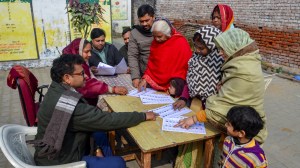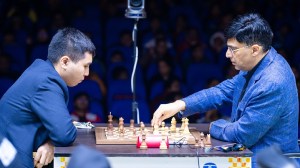The Veerappans thrive
The bard said, quot;all is well that ends well.quot; But can a conscientious citizen take such a simplistic stand on the safe return of ...

The bard said, quot;all is well that ends well.quot; But can a conscientious citizen take such a simplistic stand on the safe return of Kannada matinee idol Rajkumar? Till the time of writing, it is not known under what conditions the sandalwood smuggler and elephant poacher Veerappan released him. To make matters worse, Rajkumar has gone back on his story that it was his acting skills, about which nobody has any doubts, aided and abetted by a mysterious lady doctor, that finally hoodwinked Veerappan.
A government spokesman has conceded that some of Veerappan8217;s demands have been fulfilled. Whether Rs 10 crore or more was paid, as some newspaper reports suggest, will be known, hopefully, when the apex court forces the two governments to come out with the truth. Be that as it may, there are twodisturbing developments. One, Tamil Nadu Chief Minister M. Karunanidhi honouring the emissary team, that includes Tamil quot;nationalistquot; leader P. Nedumaran, Nakkeeran editor R.R. Gopal and Kolathur Mani, whose name figured in the investigation of Rajiv Gandhi8217;s assassination, with angavastra as if they had returned from Sydney with gold medals. Two, Nedumaran pleading against any commando operation to nab Veerappan until the Special Task Force personnel, who quot;perpetrated atrocities on the tribalsquot;, are punished. Implicit in all this is the compromise the State has made with a hardened criminal, and that is what is disturbing.
One shudders at the very thought of what the governments of Tamil Nadu and Karnataka would have done if the Supreme Court had not stood in the way of their meek surrender before the forest brigand. Of course, it8217;s not that what happened eventually is any different from such a surrender. It is doubtful whether the governments realise that it is the very thought that the state is ready to compromise that emboldened Veerappan to pick Rajkumar up. After all, did not the State negotiate with him when some lower-level government officials were kidnapped a few years ago? This reminds me of a joke I read in the Reader8217;s Digest a long time ago:
An quot;honourablequot; lady was approached by a not-so-honourable man. quot;Will you sleep with me for a night?quot; he asked.
quot;No way,quot; she shot back.
quot;But I will give you 10 billion dollars,quot; he persisted.
quot;Ten billion dollars! Then, yes,quot; she replied.
quot;That settles the question. Now let us bargain,quot; said the man gleefully.
The state governments found themselves in the pitiable position of the propositioned woman when they showed a readiness to compromise.
The Government of India faced such a moral question when, in the exuberance of freedom, a demand was made to Pandit Nehru that the State give employment in the Armed Forces to all those who served in Subhas Chandra Bose8217;s Indian National Army INA. Incidentally, it was Nehru who argued their case at the famous INA trial at Delhi8217;s Red Fort. Yet, he felt that for all their patriotism, they were rebels who had fought against the State and they had, therefore, no place in the Indian Army. Nehru had to face a barrage of criticism for this decision but he stood his ground and today, thanks to him, the Indian Army is known for its professionalism.
Decades later, the government faced a similar question when demands were made that the Sikh jawans who killed their commander at Ramgarh and ran away from the cantonment to protest the storming of the Golden Temple at Amritsar by the security forces during Operation Bluestar be taken back into service. Arguments were advanced that their rebellion was more emotional than political and they should, therefore, be given the benefit of the doubt. Fortunately, the government did not compromise on its principles. They were all discharged from service.
But the same cannot be said about all the decisions of the government. It is fairly well known now that the Punjab problem arose in the main because those who were then in power at the Centre wanted to build up Sant Bhindranwale as a counter to the established centres of power in the state. For the Frankenstein that the Centre cultivated, the nation had to pay a huge price. Similarly, the State compromised with the Tamil Tigers of Sri Lanka when it offered them land and a host of other facilities for training, little knowing that one day these forces would bite the hand that fed them. The State had no business dealing with a guerrilla group, whatever Neduraman or Vaiko may say in justification of what the Rajiv Gandhi8217;s government did.
What8217;s worse, it is no longer uncommon for governments to strike deals with criminal groups on the ground that it is necessary to fight bigger criminal groups. In other words, obliging Chhota Rajan with a passport in the State8217;s bid to get a bigger crook operating from Pakistan, or God knows where, is unethical. The greatest strength of a government is not so much the weapons in its arsenal as the courage of conviction of its leaders and their determination to uphold the rule of law, no matter what the consequence may be. When the then Union Home Minister, Mufti Mohammed Sayeed8217;s daughter Rubaiya was kidnapped, the State acquiesced to the demands of the militants in its bid to secure her release. It is this readiness to compromise that the State demonstrated that emboldened the perpetrators of Kandahar to demand and secure the release of three terrorists cooling their heels in Indian jails.
It is, again, the State which is to blame for giving Veerappan some measure of respectability. Had it been absolutely scrupulous in its conduct, surely the human rights violations inherent in the detaining of dozens of villagers for years without proper trials would not have occurred. Those women and children may have collaborated with Veerappan willingly or unwillingly, but they certainly cannot be described as dreaded terrorists against whom as draconian a law as TADA should be applied. Had the State been fair to them, Veerappan would not have got a quot;causequot; to hold on to.
For all we know, the massacre of 35 innocent Sikhs at Chitsinghpura in Kashmir might have been the handiwork of Hizbul Mujahideen and Lashkar-e-Toiba as claimed by the government, but by catching hold of five local Muslims, murdering and defacing them in order to present them as quot;hardcore Pakistani militantsquot;, the security forces have cast doubts on itsown version of the incident. The point is that the State, whatever the provocation, cannot compromise on principle. During the freedom struggle, the enlightened leadership of the Congress did not approve of the terrorist methods people like Aurobindo advocated. However patriotic the Bhagat Singhs and Khudiram Boses might have been, their ways were unacceptable. The only exception made was when the Congress defended the action of those who conspired in the sensational killing in Pune over a century ago which was, perhaps, the first act of terrorism. It8217;s this willingness to compromise that is exploited by the Veerappans. The State must at all times uphold the rule of law.
The strength of a government is not so much the weapons in its arsenal as the courage of conviction of its leaders and their determination to uphold the rule of law.
- 01
- 02
- 03
- 04
- 05































